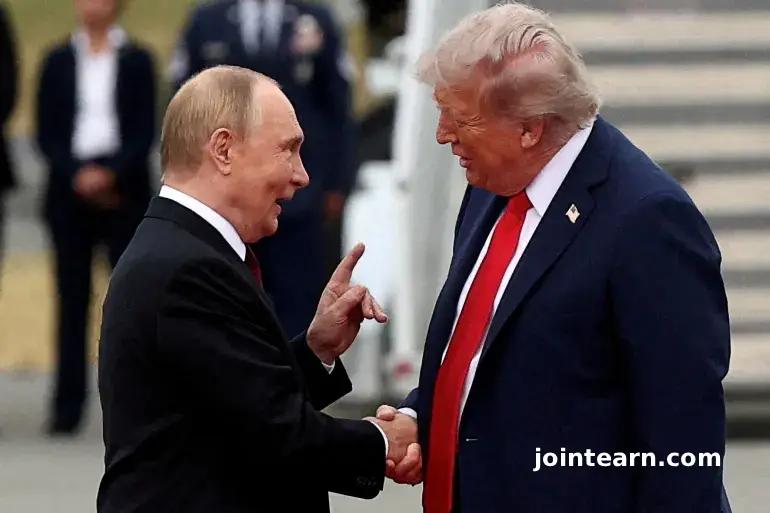
Russian President Vladimir Putin on Thursday dismissed Western attempts to force Moscow to change course after the United States and European Union unveiled fresh sanctions aimed squarely at Russia’s energy sector. Washington moved against oil giants Rosneft and Lukoil, while Brussels adopted sweeping measures that include a ban on liquefied natural gas (LNG) imports — steps designed to squeeze Moscow’s principal revenue streams for the Ukraine war.
“These measures are serious for us, of course,” Putin said, attempting to strike a defiant tone. “They will have certain consequences, but they will not significantly impact our economic wellbeing. No self-respecting country and no self-respecting people ever decide anything under pressure.”
What the U.S. and EU announced
- United States: President Donald Trump announced sanctions targeting Russia’s two largest oil companies, Rosneft and Lukoil, and warned foreign banks and institutions that continued business with those firms could face secondary consequences.
- European Union: The bloc approved a new package of sanctions that broaden restrictions on Russian energy, including an LNG import ban, additional trade and financial measures, and blacklisting of entities and intermediaries the EU believes are helping Moscow evade earlier curbs.
Both measures are intended to choke off revenue Moscow uses to finance its military campaign in Ukraine and to limit its ability to sell oil and gas on global markets.
Putin: consequences, but not capitulation
Putin called the U.S. and EU moves an “unfriendly act” but framed them as something Russia can withstand. He acknowledged the sanctions will have economic effects but argued Moscow would adapt rather than comply with Western demands.
On the prospect of Western nations providing long-range missiles such as Tomahawks to Ukraine, Putin warned such a transfer would constitute a dangerous escalation. “If such weapons are used to attack Russian territory, the response will be very serious, if not overwhelming,” he said.
Putin’s comments came amid uncertainty over a hoped-for in-person meeting with Trump. The White House had signalled interest in talks after a phone call, but Trump said this week he was cancelling a planned summit following disagreements over a ceasefire proposal. The White House later kept the door open, saying leaders could meet if a “tangible positive outcome” was possible.
Why energy sanctions matter
Energy exports are a primary pillar of Russia’s economy and the main source of hard currency for its government. Targeting Rosneft and Lukoil — two of the state’s biggest producers and traders — and curbing LNG sales narrows Moscow’s options:
- Revenue shock: Reduced access to markets and buyers could depress oil and gas revenues, constraining Russia’s defence and fiscal budgets.
- Market disruption: Sanctions on majors and tighter rules on intermediaries can complicate global supply chains and force buyers — notably in Asia — to find alternatives or face financial penalties.
- Secondary pressure: Threats to banks and trading houses that continue to deal with sanctioned firms aim to isolate Russia financially beyond direct energy restrictions.
However, sanctions also carry risks: higher global energy prices, market volatility, and diplomatic strain with countries (like India and some in Asia and Africa) that have continued to import Russian oil.
Moscow’s likely responses and broader implications
Russia has painted the sanctions as economic warfare and vowed countermeasures. Possible Kremlin responses include:
- Trade realignment: Intensifying sales to non-Western buyers at discounted prices.
- Financial counters: Restrictions on Western firms, currency controls, or using state reserves and domestic markets to cushion impacts.
- Military posturing: Increased rhetoric or military moves to deter further Western involvement in the conflict.
For Europe and the U.S., the measures are a calculated risk: they increase pressure on Moscow but also raise costs for consumers and businesses in the short term. Strategically, they form part of a broader Western effort to make the continuation of the war unsustainable for Russia.
Where things stand on diplomacy
The sanction announcements and public exchanges around potential weapons transfers have complicated diplomatic channels. Trump has toggled between proposing a ceasefire along existing front lines and criticizing Putin; Putin has firmly rejected concessions that would cede territory taken during the campaign. Both leaders have signalled they could meet in future, but substantive progress requires bridging fundamentally opposed positions on Ukraine’s borders and security guarantees.
Key takeaways
- The U.S. sanctioned Rosneft and Lukoil; the EU banned LNG imports and rolled out additional energy and financial measures.
- Putin acknowledged the sanctions are “serious” but insisted Russia will not bow to pressure.
- The moves aim to choke Russia’s war funding but carry risks of global energy market disruption and diplomatic fallout.
- Tensions over potential Western provision of long-range missiles to Ukraine raise fears of further escalation.
- A Trump-Putin summit remains possible but hinges on moving past irreconcilable positions on territorial concessions and security conditions.


Leave a Reply